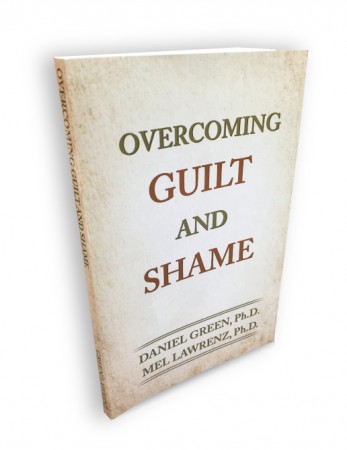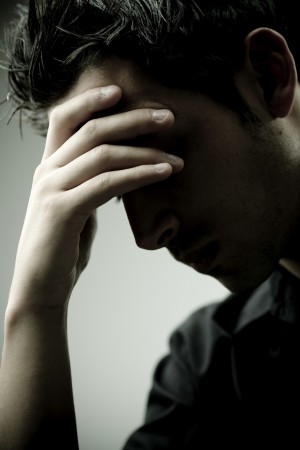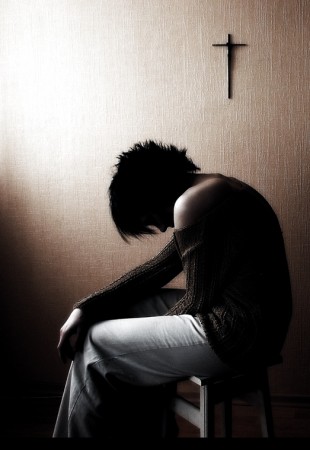I sometimes think that shame, mere awkward, senseless shame, does as much towards preventing good acts and straightforward happiness as any of our vices can do.
—C.S. Lewis
 [From the new release, Overcoming Guilt and Shame by Daniel Green and Mel Lawrenz. Previously, Why Do I Feel Like Hiding?]
[From the new release, Overcoming Guilt and Shame by Daniel Green and Mel Lawrenz. Previously, Why Do I Feel Like Hiding?]
IT’S NOT JUST YOU
We all experience guilt and shame. Living as members of a fallen race in a fallen world has made it inevitable that we will have to deal with being wrong and feeling wrong at different times. We all go through our own internal ways of checking our attitudes or actions. Most people experience an inner conflict when they know that what they do or say is “wrong” by some internal set of standards. There are any number of different ways in which we react. Sometimes we try to change our behaviors, other times we adjust our standards to try to justify ourselves. And there is always the possibility that we will just try waiting the feeling out.
There is a whole range of experiences in which we feel ashamed. If our consciences are intact, we will feel ashamed when we violate God’s standards. Then again, we may experience shame apart from any moral violation on our part. From the simple embarrassment of realizing you put on two different colored socks, to the remorse for having disappointed a friend, to the mortification of being belittled by a parent, we routinely experience the sense of incompleteness or disconnection that comes from living in a disconnected world.
Some people feel trapped in prisons of shame. Their experience goes way beyond the ordinary field of play of the conscience. It’s not just that they “feel guilty” about some things, they feel it about everything. It can get to the point where they no longer even think in terms of guilt. All they know is that all of life looks foreboding; they feel incapable of handling any kind of life challenge; they certainly do not feel up to handling relationships with others.
We all have many questions about guilt and shame: How can I get past my guilt? How can I become less ashamed? How can I know when I am really guilty before God and when not? Why do I feel so wrong when there is no apparent cause? How can some people do things that are so hurtful and not feel ashamed at all? Where do guilt and shame figure into the Christian life? Are Christians supposed to feel guilty all the time because they are sinners?
WHAT IS SHAME?
Shame is an emotion. It may or may not be related to something specific you do. It may come unexpectedly. It may be a constant, relentless voice shouting words of self-condemnation, or it may be a subtle whisper. It may be helpful, or it may be destructive. As one of the most basic emotions that we experience, like anger or joy or sadness, shame is simply our internal reaction to things going on around or inside us.
 What is it that prompts a blushing face? Mark Twain said that human beings are the only kind of animals who blush—or need to. That flushed face says that there is a rush of inner, conflicting feelings, a mild or strong sense of shame. The fair-skinned really talented blushers of this world have this facial readout that tells everyone around them, “I’m ashamed right now!” Blushers do not necessarily like blushing. But don’t we all like blushers all the more for his or her blushing? Any honest person will think, “even though my face doesn’t show it, I often feel the same way that person looks.” Maybe it was because you said something you wish you could take back, maybe because someone humiliated you in public, then again that racing heart may come when someone says something good about you, and though that feels good, it also brings the embarrassment of being in the limelight, of being exposed.
What is it that prompts a blushing face? Mark Twain said that human beings are the only kind of animals who blush—or need to. That flushed face says that there is a rush of inner, conflicting feelings, a mild or strong sense of shame. The fair-skinned really talented blushers of this world have this facial readout that tells everyone around them, “I’m ashamed right now!” Blushers do not necessarily like blushing. But don’t we all like blushers all the more for his or her blushing? Any honest person will think, “even though my face doesn’t show it, I often feel the same way that person looks.” Maybe it was because you said something you wish you could take back, maybe because someone humiliated you in public, then again that racing heart may come when someone says something good about you, and though that feels good, it also brings the embarrassment of being in the limelight, of being exposed.
Then there is the bowed head. What do we do when we are ashamed? We turn our eyes downward, avoiding eye contact as a part of withdrawal or hiding. We might even hang our heads. As an attempted solution, we speak of “saving face.” You can even see some people pulling their heads backward rigidly, trying to look unabashed. If someone has ever told you to “keep your chin up” it is because they do not want to become fixed in a stance of shame. No one wants to suffer the indignity of “losing face.” We might even try pasting on a look of contempt, or just freeze the face in an emotionless mask. To let others know that we feel ashamed will only add shame on top of shame. Some hide behind performance. If the ego is threatened with shame, the person goes to work, doing that function or playing the role that has always scored points with others. For Adam and Eve it meant hiding amidst the trees of the garden.
Shame may come when we really did something wrong, and in this instance is a God-given friend who is warning us of the dangers of moral violation—or it may come when someone else has imposed an unfair and critical judgment on us. We see it all the time, people controlling other people through belittling and depreciating. Here shame is the unfortunate wound of a vulnerable conscience. In both instances the feeling is the same in kind. The victim of rape may deal for a long time with the shame of feeling less as a person, but the rapist, in some cases, may go through the shame of remorse. Both are ashamed, but for entirely different reasons, requiring totally different responses. This is the great challenge: How do we discern the difference between times when shame is a friend, and when it is an unwelcome intruder.
Some people deal with shame in an average kind of way. In the course of a day they may feel remorse for having been too harsh with the children, then embarrassed when they accidently walked out of the store without paying for an item, then just basically discouraged because they were able to accomplish only half of what they wanted to in the day.
For others shame has become the crippled posture of their lives. They live constricted lives because no matter where they turn or what they do they feel ashamed. They are offered a promotion at work, and they have a sense of dread that they will not be able to live up to expectations, they fuss about their appearance, always feeling like people are seeing them as slovenly, and then when they do make a mistake, even a simple one, they spiral downward in a dark tunnel of shame, sure that others now know just what rotten people they are. Shame itself can trigger more shame, resulting in an ever-louder voice of condemnation. Not surprisingly, a person bound by shame in this way was probably profoundly influenced by the demeaning behaviors of others earlier in life.
WHAT IS GUILT?
In its primary sense “guilt” is not a feeling, but a status. We determine guilt with our thinking capabilities, making judgments about the behavior of ourselves or of others. Because we have concepts like “guilty,” and its opposite, “innocence,” we can make moral judgments in life. We can seek to do the “right thing” and hope that the other guy does right by us.
“Feeling guilty” in many instances is not the problem, but the occasion for change. We do not like the feeling; we want to get past it. There is nothing surprising there. But whereas one person needs to get out from under the unfair false accusations of others, another needs to correct a situation where he or she is morally responsible.
 In this day and age we tend to concentrate on the subjective. People sometimes are more concerned about the issue of feeling guilty than being guilty. Yet consider the courtroom. If you are a defendant in a trial, you know that there will be one of two outcomes. You will either walk freely out of the court if the judge or jury returns a “not guilty” verdict, or you will fall under the sanctions of the court if pronounced “guilty.” The issue is solely that of whether you violated the standards of an objective rule, the law. So should we evaluate many of our actions on a day-by-day basis.
In this day and age we tend to concentrate on the subjective. People sometimes are more concerned about the issue of feeling guilty than being guilty. Yet consider the courtroom. If you are a defendant in a trial, you know that there will be one of two outcomes. You will either walk freely out of the court if the judge or jury returns a “not guilty” verdict, or you will fall under the sanctions of the court if pronounced “guilty.” The issue is solely that of whether you violated the standards of an objective rule, the law. So should we evaluate many of our actions on a day-by-day basis.
If someone has great emotional distress because he bought stock with inside information, the issue is not just how he is going to deal with his feelings, but how he will judge his actions. If a husband is laden with shame because his wife is blaming him for everything that is wrong in their marriage, he needs to sort out where he has been guilty and where not. The teenager, who tells her parents not to lay one more “guilt trip” on her, needs not just to react to her parents’ voice, but also to figure out whether there is any truth in their judgment of her actions.
Look in almost any dictionary and you will find the original objective idea of guilt. One dictionary defines guilt as “the fact of being responsible for an offense or wrongdoing.” Only secondarily does it list “remorseful awareness of having done something wrong or of having failed to do something required or expected.” The imposing Oxford English Dictionary overwhelmingly stresses the objective sense of guilt: it is “a failure of duty, delinquency; offense, crime, sin; responsibility for an action or event; the fact of having committed some specified or implied offense; criminality; culpability.” Guilt begins as a question of status. Am I guilty or not? Is someone else besides me the actual guilty party? Thus the opposite of guilt is innocence, not the feeling of having a clear conscience. Haven’t we all met people whose consciences do not bother them, but they are plenty guilty?
We get this notion of guilt from biblical truth. The whole point of the sacrificial system in the Old Testament and the forgiveness offered us through the cross of Christ is that God has provided ways for us to get out from under a verdict of “guilty.” Dealing with the associated feelings is a part of the process to be sure, for the Scriptures talk about having your conscience cleaned and made pure. But it all has to begin with a solution for the fact of being sinners and the fact of having sinned.
GETTING OUR THINKING STRAIGHT
It is desperately important that when we try to understand our guilt and shame we not look at part of the puzzle isolated from the whole. Many people are in a desperate search for relief from the chronic feelings of pained consciences. They just want not to “feel so guilty.” But if we only consider our feelings apart from the objective issues of whether we are guilty, we may miss the very solution to the problem. After all, the problems of the human race began when the first generation did something wrong.
On the other hand, someone’s problems with guilt or shame may not be addressed at all by simply assuming that the person “blew it” somewhere and he or she needs just to look hard enough to find his or her guilt. Job’s counselors probed around, trying to find out where he had transgressed against God, totally missing the point that Job was feeling so low simply because of the pain and losses in his life.
If guilt and shame are obvious universal human predicaments (and psychology has only further confirmed their universality), then the Christian gospel offers the only comprehensive solution to all manifestations of guilt and shame. To put it in a nutshell: the Christian gospel offers forgiveness for guilt, cleansing of conscience for moral shame, vindication for imposed shame, and acceptance of the person in the face of natural shame. This message of salvation in the broad sense, is further validated by the Christian view of sin, which is the only realistic way of sizing up who we are, where we are responsible, and where lie the faults of others as well. Because there is an antidote—a complete and effective antidote—it is not unbearable to look at the problems in us and in others.
________________________________
From the new release, Overcoming Guilt and Shame by Daniel Green and Mel Lawrenz. Previously, Why Do I Feel Like Hiding?

solo me gustaria saber si este blog está disponible en español….